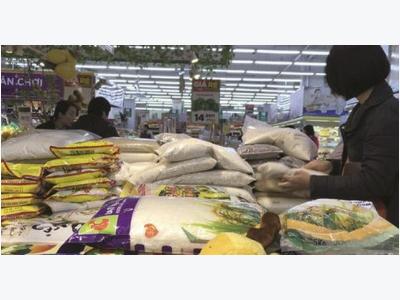Thai rice worries VN exporters

Customers buy rice at the Big C supermarket, Long Bien district, Ha Noi. Vietnamese rice businesses are now focusing on the domestic market instead of exports. - VNA/VNA Photo Thai Ha
Thailand’s plan to sell all its rice reserves of about eight million tonnes this year has sparked concerns that this move will undermine Viet Nam’s rice exports.
Nguyen Van Don, director of Tien Giang-based Viet Hung Co Ltd, said rice exports were positive last month, with many contracts signed.
But starting early last week, trading tended to slow, he said, adding that his company has not had any new export contracts. He attributed this to the higher prices of Vietnamese rice compared to last month, and to Thailand’s plan to sell all of its rice stockpiles.
Dang Thi Lien, director of Long An Foodstuff Co Ltd, said the price of Vietnamese five per cent and 15 per cent broken rice was US$5-10 a tonne higher than the same kinds of Thai rice.
To compete with Thai rice, Vietnamese traders should lower their export price, but domestic rice prices are on the rise, even higher than export prices, making it hard for traders to compete abroad, she said.
Huynh The Nang, chairman of Viet Nam Food Association, said “It will be hard to compete with Thailand in exporting white rice due to our less competitive prices.”
Vietnamese firms previously exported a lot of white rice to Africa, but now firms are only exporting fragrant rice to the market, he said.
“Thailand’s determination to sell all of the rice in stockpiles in the first half of the year will continue to adversely affect Viet Nam’s rice exports. Viet Nam’s export rice prices are predicted to drop further this year. Only when Thailand’s rice stockpiles are sold out can the rice export market recover,” he said.
Domestic market
Viet Nam produces about 44-45 million tonnes of paddy a year, equivalent to 22-22.5 million tonnes of rice. Domestic consumption accounts for about 15-16 million tonnes a year, and the rest is for export.
Despite being one of the world’s largest rice exporters, Viet Nam’s high-grade rice segment is dominated by foreign brands.
Nang, who is also general director of the Viet Nam Southern Food Corporation (Vinafood 2), said many domestic rice enterprises have implemented strategies to promote their rice brands as well as boost consumption of their products in the home market.
Enterprises have established their own farm and production facilities and are focusing on improving the quality of their rice to international standards as well as building brands for their products.
Last December, Tien Giang Food Company introduced to the market four to five new rice brands, which are produced following hygiene and food safety standards and are able to enter the US market.
In the case of Song Hau Food Company, a member of Vinafood 2, thanks to actively promoting its rice brands and expanding its distribution system, the company last year doubled its domestic sales revenue from 2015, he said.
Other companies, such as Dong Thap Food Company and HCM City Food Joint Stock Company, have actively improved their distribution systems, he said.
Consumption volume of Vietnamese rice in the domestic market is expected to increase significantly in the coming time, especially as more and more rice is produced following hygiene and food safety standards.
In addition, programmes to enable consumers to trace the origin of rice will be sped up this year, he said.
Pham Minh Thien, director of Dong Thap-based Co May Private Enterprise, said: “We have a market of more than 90 million people. This is a very good foundation for us to deal with the supply and demand dynamic of the rice market.”
Related news
 Local fertiliser industry growing
Local fertiliser industry growing Viet Nam uses 11 million tonnes of fertiliser annually, 90 per cent of it inorganic, and its consumption of local products is rising
 Viet Nam’s pepper faces stern quality challenge
Viet Nam’s pepper faces stern quality challenge Vietnamese pepper will face stricter scrutiny this year on excessive use of agricultural pesticides, especially in the EU and US markets, experts say.
 Dak Lak to shift coffee strategy
Dak Lak to shift coffee strategy The Central Highlands province of Dak Lak plans to increase the proportion of processed coffee such as instant coffee, powdered coffee from less than 10 percent